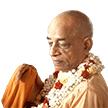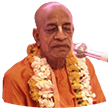Jiva - an essential subject: Difference between revisions
Nayanranjani (talk | contribs) (Created page with "Category:Essential Subjects <!----------------------- edit below this line -----------------------> <!------------------------ begin introduction text below ------------...") |
(Vanibot #0041: Moves Choose Another box to the end) |
||
| Line 2: | Line 2: | ||
<!----------------------- edit below this line -----------------------> | <!----------------------- edit below this line -----------------------> | ||
<!------------------------ begin introduction text below ------------------------> | <!------------------------ begin introduction text below ------------------------> | ||
Jiva generally means 'a life', but a deeper meaning derived from the Vedas is 'the individual soul'. All of us in this world are parts and parcels of something bigger and more expansive than what we can merely perceive with our limited senses. That bigger 'something' (or rather 'someone) is God; our creator. Whereas material science has relentlessly come up with various failing theories about our origins, spiritual science found in the Vedas state very clearly that our origin is Lord Krishna who is the supreme atma (paramatma), while we are known as jivatmas (the living entities conditioned by the material nature). In order to break through this strong conditioning and reach the platform of self-realization, we have to sincerely undertake scriptural studies under the guidance of a bona fide spiritual master. | |||
Srila Prabhupada's books, lectures, conversations and letters offer a comprehensive presentation of this essential subject as seen in the Vaniquotes '''[[Vaniquotes:Category:Jiva|Jiva]]''' category. An introduction from his books is given below in the following | Srila Prabhupada's books, lectures, conversations and letters offer a comprehensive presentation of this essential subject as seen in the Vaniquotes '''[[Vaniquotes:Category:Jiva|Jiva]]''' category. An introduction from his books is given below in the following 8 quotes. | ||
<!-------- end introduction text and don't touch next three lines ---------> | <!-------- end introduction text and don't touch next three lines ---------> | ||
---- | ---- | ||
== Quotes from Srila Prabhupada's books == | == Quotes from Srila Prabhupada's books == | ||
<!----------------- edit quote boxes below this line -----------------> | <!----------------- edit quote boxes below this line -----------------> | ||
{{VaniQuotebox| | {{VaniQuotebox|Another name of Vasudeva is Paramatma, another name of Sankarsana is jiva (the living entity), another name of Pradyumna is mind, and another name of Aniruddha is ahankara (false ego)|From Vāsudeva, who is the primary expansion, come Saṅkarṣaṇa, Pradyumna and Aniruddha in that order. Another name of Vāsudeva is Paramātmā, another name of Saṅkarṣaṇa is jīva (the living entity), another name of Pradyumna is mind, and another name of Aniruddha is ahaṅkāra (false ego). Among these expansions, Vāsudeva is considered the origin of the material nature. Therefore Śaṅkarācārya says that Saṅkarṣaṇa, Pradyumna and Aniruddha must be creations of that original cause. '''(Caitanya-caritāmṛta, Ādi-līlā 5.41)'''}} | ||
{{VaniQuotebox| | {{VaniQuotebox|Arjuna, the jiva soul, is represented as forgetful of his many, many previous births, but the Lord, the Supersoul, is not forgetful|In the Bhagavad-gītā these separate positions of the jīva-ātmā and the Paramātmā are specifically mentioned. In the Fourth Chapter, Arjuna, the jīva soul, is represented as forgetful of his many, many previous births, but the Lord, the Supersoul, is not forgetful. The Lord even remembers when He taught the Bhagavad-gītā to the sun-god some billions of years before. '''(Śrīmad-Bhāgavatam 2.10.9)'''}} | ||
{{VaniQuotebox| | {{VaniQuotebox|As confirmed in the Vedic Upanisad, the Paramatma and the jivatma, who are likened to two birds, are sitting in the body|As confirmed in the Vedic Upaniṣad, the Paramātmā and the jīvātmā, who are likened to two birds, are sitting in the body. The jīvātmā is enjoying or suffering by eating the fruits of the bodily activities, but the Paramātmā, who is free from such bondage, witnesses and sanctions the activities of the individual soul as the individual soul desires. '''(Śrīmad-Bhāgavatam 7.2.47)'''}} | ||
{{VaniQuotebox| | {{VaniQuotebox|External maya is exhibited in two phases - jiva-maya, the living entities, and guna-maya, the material world. In the material world there is prakrti (material nature) and pradhana (the ingredients of material nature)|External māyā is exhibited in two phases—jīva-māyā, the living entities, and guṇa-māyā, the material world. In the material world there is prakṛti (material nature) and pradhāna (the ingredients of material nature). However, for one who becomes Kṛṣṇa conscious, the distinction between material and spiritual varieties does not exist. An advanced devotee like Prahlāda Mahārāja sees everything as one—Kṛṣṇa. '''(Caitanya-caritāmṛta, Madhya-līlā 12.194)'''}} | ||
{{VaniQuotebox| | {{VaniQuotebox|Human life is simply awarded to a living entity (jiva) so that he can realize his spiritual identity and his permanent source of happiness|Even a fraction of the duration of life wasted cannot be compensated by any amount of gold. Human life is simply awarded to a living entity (jīva) so that he can realize his spiritual identity and his permanent source of happiness. A living being, especially the human being, is seeking happiness because happiness is the natural situation of the living entity. But he is vainly seeking happiness in the material atmosphere. '''(Śrīmad-Bhāgavatam 2.3.17)'''}} | ||
{{VaniQuotebox| | {{VaniQuotebox|The jiva-prakrti is called superior because the jiva has consciousness which is similar to the Lord's. The Lord's is supreme consciousness, however, and one should not claim that the jiva, the living entity, is also supremely conscious|The jīvas, or the living entities, being parts and parcels of the Supreme Lord, are also conscious. Both the living entity and material nature are explained as prakṛti, the energy of the Supreme Lord, but one of the two, the jīva, is conscious. The other prakṛti is not conscious. That is the difference. Therefore the jīva-prakṛti is called superior because the jīva has consciousness which is similar to the Lord's. The Lord's is supreme consciousness, however, and one should not claim that the jīva, the living entity, is also supremely conscious. '''(Bhagavad-gītā, Introduction)'''}} | ||
{{VaniQuotebox| | {{VaniQuotebox|Mayavada philosophy enunciates that the whole spirit exists, but a part of it, which is called the jiva, is entrapped by illusion. This philosophy, however, is unacceptable because spirit cannot be divided like a fragment of matter|One should not think that because the individual soul is a particle, it is fragmented from the whole spirit. Māyāvāda philosophy enunciates that the whole spirit exists, but a part of it, which is called the jīva, is entrapped by illusion. This philosophy, however, is unacceptable because spirit cannot be divided like a fragment of matter. That part, the jīva, is eternally a part. As long as the Supreme Spirit exists, His part and parcel also exists. As long as the sun exists, the molecules of the sun's rays also exist. '''(Śrīmad-Bhāgavatam 3.25.17)'''}} | ||
{{VaniQuotebox| | {{VaniQuotebox|The Lord is infallible in the material world because He is the supreme spiritual person. Similarly, the jivas, who are part and parcel of the Lord, can also become infallible|The devotees are referred to as acyuta-gotra, or the dynasty of the Supreme Personality of Godhead. The Lord is called Acyuta, as indicated in Bhagavad-gītā (senayor ubhayor madhye rathaṁ sthāpaya me 'cyuta (BG 1.21)). The Lord is infallible in the material world because He is the supreme spiritual person. Similarly, the jīvas, who are part and parcel of the Lord, can also become infallible. '''(Śrīmad-Bhāgavatam 7.7.54)'''}} | ||
<!----------------- edit quote boxes above this line -----------------> | <!----------------- edit quote boxes above this line -----------------> | ||
| Line 31: | Line 31: | ||
'''Jiva - [[Vaniquotes:Category:Jiva|explore more within this category]]'''. | '''Jiva - [[Vaniquotes:Category:Jiva|explore more within this category]]'''. | ||
{{EsentialSubjectTotal}} | {{EsentialSubjectTotal}} | ||
<div style="float:left;"> | |||
{{EssentialSubjectnav}} | |||
</div> | |||
__NOTOC__ | __NOTOC__ | ||
__NOEDITSECTION__ | __NOEDITSECTION__ | ||
Latest revision as of 16:37, 22 November 2020
Jiva generally means 'a life', but a deeper meaning derived from the Vedas is 'the individual soul'. All of us in this world are parts and parcels of something bigger and more expansive than what we can merely perceive with our limited senses. That bigger 'something' (or rather 'someone) is God; our creator. Whereas material science has relentlessly come up with various failing theories about our origins, spiritual science found in the Vedas state very clearly that our origin is Lord Krishna who is the supreme atma (paramatma), while we are known as jivatmas (the living entities conditioned by the material nature). In order to break through this strong conditioning and reach the platform of self-realization, we have to sincerely undertake scriptural studies under the guidance of a bona fide spiritual master.
Srila Prabhupada's books, lectures, conversations and letters offer a comprehensive presentation of this essential subject as seen in the Vaniquotes Jiva category. An introduction from his books is given below in the following 8 quotes.
Quotes from Srila Prabhupada's books
Jiva - explore more within this category.
Vanipedia has now over 903 introductory articles compiled from Srila Prabhupada's books under the series titled Essential Subjects. All these articles can be seen in the Table of Content on the right side of this article and also here in this Umbrella Category. Browse through them to relish the breadth and depth of Srila Prabhupada's teachings - There is a subject for everyone.







